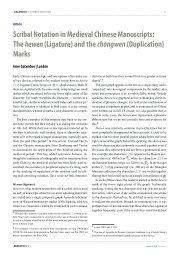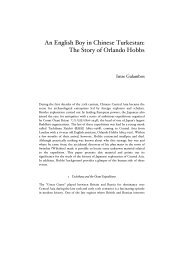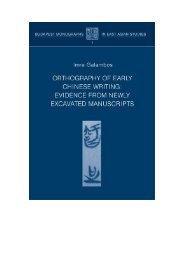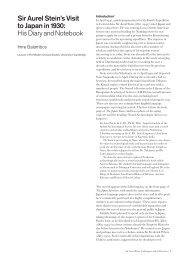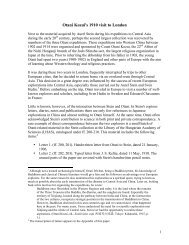Japanese 'Spies' along the Silk Road - Chinese manuscripts
Japanese 'Spies' along the Silk Road - Chinese manuscripts
Japanese 'Spies' along the Silk Road - Chinese manuscripts
Create successful ePaper yourself
Turn your PDF publications into a flip-book with our unique Google optimized e-Paper software.
54 <strong>Japanese</strong> Religions 35 (1 & 2)<br />
Russian spellings of <strong>the</strong> above <strong>Japanese</strong> secret agent vary (Hayashi, Hayashide<br />
Kamatsu, Komatsu Harayashide) but it is likely that <strong>the</strong>y all refer to Hayashide<br />
Kenjirō 林出賢次郎 (1882-1970), who later went on to a highly visible career<br />
of a diplomat, serving at embassies and consulates in Hankou (1929), Shanghai<br />
(1929) and Mukden (1932). At one point he also served as a personal interpreter<br />
to Pu Yi 溥儀 (1906-1967), <strong>the</strong> <strong>Japanese</strong>-installed emperor of <strong>the</strong> puppet state<br />
of Manchukuo. 31 In view of his activities in Xinjiang, it is ra<strong>the</strong>r ironic that it<br />
was <strong>the</strong> movements of Tachibana and Nomura that generated an array of secret<br />
correspondence between Kashgar and Simla. Surely, as a trained intelligence<br />
officier on an active mission, Hayashide would have been careful not to do anything<br />
that might have caused suspicions. 32 In contrast with this, everything Tachibana<br />
and Nomura did appeared suspicious to outside observers. One such thing was<br />
<strong>the</strong>ir library of English books, that proved a great mystery in light of <strong>the</strong>ir lack of<br />
language skills. Shuttleworth’s report describes <strong>the</strong> library <strong>the</strong> following way:<br />
27th June. I returned Nomura’s call. The <strong>Chinese</strong> have made him exceedingly<br />
comfortable in a very nice house with a large garden outside <strong>the</strong> city. He showed me<br />
some of <strong>the</strong> antiquities he had collected. I noticed he had a large library of English<br />
books, including Curzon’s “Pamirs,” Stein’s “Ancient Khotan,” Putnam Weale’s “The<br />
Truce in <strong>the</strong> East and its Aftermath” and books by Deasy, Ellsworth Huntington,<br />
Sven Hedin and Cobbold. I also saw several military works, such as “The War in<br />
<strong>the</strong> Far East” by <strong>the</strong> military correspondent of <strong>the</strong> Times, and one or two naval<br />
books by Mahan. Nomura distinctly told me he could nei<strong>the</strong>r speak nor read<br />
English. (Kashgar Diaries and News Reports, Diary for <strong>the</strong> ten days ending 30th<br />
June 1909, L/P&S/IO/55/230)<br />
Although at this point Nomura claimed that Tachibana could speak English<br />
fluently, this later proved to be completely untrue, at least from <strong>the</strong> point of view of<br />
native English-speakers such as Shuttleworth and his American guests. Of course,<br />
it is by no means a distinguishing attribute of a spy to carry with him a library of<br />
books in a language he could not read, but <strong>the</strong>se circumstances made <strong>the</strong> <strong>Japanese</strong><br />
explorers appear odd, and consequently suspicious.<br />
The correspondence between Kashgar and Simla also triggered fur<strong>the</strong>r<br />
actions, among which was that Sir Claude MacDonald, <strong>the</strong> British Minister (i.e.<br />
ambassador) in Tōkyō made a formal enquiry towards <strong>the</strong> <strong>Japanese</strong> Ministry of<br />
31. The Diplomatic Record Office of <strong>the</strong> <strong>Japanese</strong> Ministry of Foreign Affairs contains a<br />
wealth of material related to Hayashide’s activities.<br />
32. Mannerheim’s diary mentions Hayashide when passing through Urumchi in June<br />
1906 in connection with <strong>the</strong> newly established high school, finding irony in <strong>the</strong> fact<br />
that <strong>the</strong> <strong>Japanese</strong> was in charge of teaching English, although according to <strong>the</strong> Russian<br />
Consul he did not speak English at all. (Mannerheim 2008: 352)



